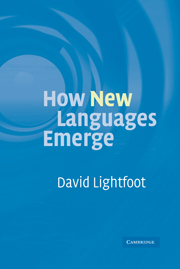Book contents
- Frontmatter
- Contents
- Preface
- 1 Internal languages and the outside world
- 2 Traditional language change
- 3 Some properties of language organs
- 4 Languages emerging in children
- 5 New E-language cuing new I-languages
- 6 The use and variation of grammars
- 7 The eruption of new grammars
- 8 A new historical linguistics
- References
- Index
6 - The use and variation of grammars
Published online by Cambridge University Press: 02 February 2010
- Frontmatter
- Contents
- Preface
- 1 Internal languages and the outside world
- 2 Traditional language change
- 3 Some properties of language organs
- 4 Languages emerging in children
- 5 New E-language cuing new I-languages
- 6 The use and variation of grammars
- 7 The eruption of new grammars
- 8 A new historical linguistics
- References
- Index
Summary
The use of grammars
Children hear E-language, language out there, and E-language may change; it may change in such a way that it triggers new I-languages, as we saw in the last chapter. New E-language may result from prior changes in I-languages or because people come to use their grammars differently or because there are new social mixes of grammars. There is more to a person's speech than his/her I-language.
Grammars are used and some elements of their use result from general properties of the human cognitive system, others are more idiosyncratic, and that distinction is fundamental. In fact, we need two distinctions: grammars need to be distinguished from the way in which they are used (Newmeyer 2003), and general use functions need to be distinguished from specific, learned strategies. Let us consider some examples.
(1a) is ambiguous between a deontic and epistemic reading. It might mean that John is under an obligation to study or it must be the case that John is a student (for example, because he drinks cheap wine). (1b) is ambiguous in precisely the same way. That would lead us to expect that (1c) would be four-ways ambiguous: deontic–deontic, epistemic–epistemic, deontic–epistemic, or epistemic–deontic. This turns out to be false: (1c) is only two-ways ambiguous and each conjunct must have either the epistemic reading or the deontic, but no mixing is possible.
- Type
- Chapter
- Information
- How New Languages Emerge , pp. 112 - 138Publisher: Cambridge University PressPrint publication year: 2006



